It might feel like a tired cliché but the New Year is often a good time to find the inspiration and try new things, in particular hobbies or habits that improve your quality of life. Yoga is a popular way to stay fit and flexible at any age, and Mona Flynn, an award-winning and local yoga teacher, has been running classes through her own yoga business, Life Fit Yoga.
A few years back, Mona, started a program called “Yoga Therapy for Immigrant and Refugee Women”. Having been an immigrant herself who moved to the U.S. as a child, she began this community seva (selfless service) as a desire to help the Syrian refugees in their heightened time of crisis.
Due to her hard work, it was a success and in 2020 she won the International Association of Yoga Therapists’ Seva Award, which is given to recognize the efforts of yoga therapists who create change by sharing their work in unserved communities. The growth of the program turned a corner in 2021, and now this new non-profit, “The Yoga Connection“, offers an 8-week session of classes each Spring and each Fall.
Yoga benefits for refugee women
Starting February 1st through March 22nd 2022, The Yoga Connection, a community service program in Greensboro, North Carolina will be providing free accessible yoga classes for immigrant and refugee women, at the New Arrivals Institute (NAI), a training centre that teaches English to refugees and immigrants, as well as other useful skills such as: job readiness, health education, cultural and community orientation, Citizenship classes, and is a resource bank that serves the community at large concerning refugee and immigrant issues.
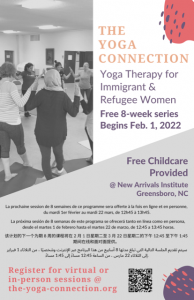 Mona started reaching out to Syrian refugees, helping with translations and immediate relief, working along with different local resettlement agencies. But over the years, she understood the deep-rooted socio-economic and psychological weight that the community carries, and started working on using the healing powers of yoga to address the unique refugee issues.
Mona started reaching out to Syrian refugees, helping with translations and immediate relief, working along with different local resettlement agencies. But over the years, she understood the deep-rooted socio-economic and psychological weight that the community carries, and started working on using the healing powers of yoga to address the unique refugee issues.
The classes with refugees at the NAI started in 2019, on the premises of the Peace United Church of Christ, that gave NAI and The Yoga Connection the space to conduct the classes. This year, the classes will be held every Tuesday from 12:24pm to 1:45 pm, to align the program after NAI English as a Second Language, Citizenship and other classes, so that the women would save time, energy and transportation to avoid having to come in on a separate day. Additionally, there is free childcare.
“The benefits of yoga are many and if you ask any yogi, you will get a unique answer,” says Mona. “It is beautiful to listen to how each person will articulate the yoking of awareness that comes from a more traditional practice which involves respect for incorporating asana (the physical postures), pranayama (breath control), mantra (the power of sound, intentions, words/phrases), mudra (tapping into the energy body), and more,” she says.
Aimed mainly at women, The Yoga Connection program has designed classes especially keeping the immigrants and local women in mind. Mona shares how it is not uncommon to see women put their self-care last, always working on behalf of their families. “Though that may be stereotypical of parents in general, women immigrants and refugees often have a language barrier which also hampers self-advocacy and agency in health needs,” she says.
She feels that attending a group yoga class, just for women, allows the movement of yoga asana to be strengthening and the amazing integrative benefits of yoga which go well beyond the physical aspects to become interwoven with the socializing and community building. “Though we all must prioritize staying healthy in a preventative way, for this population, exercise, mental and social health are often not as well accessed, and a community yoga class provides all of these advantages.” In a recent article, Mona wrote about the positive impact and benefit that immigrants can have if they practice yoga.
Immigrant women are vulnerable to unequal power relations, and their adjustments to society’s expectations are filled with specific considerations to be aware of, even to the possible inability to freely perform physical activity and make time for self-care.
Post-traumatic stress disorder (PTSD) is a debilitating condition that affects approximately 10% of women in the United States. PTSD prevalence is likely much higher for those who are refugees and asylum-seekers.
Yoga may down regulate the stress response and positively affect PTSD as well as co-morbid depression and anxiety symptoms. Findings of the effectiveness of yoga for PTSD underscore the need for future research investigating the mechanisms by which yoga may impact mental health symptoms, gender comparisons, and the long-term effects of yoga practice.
Yoga in Greensboro, USA
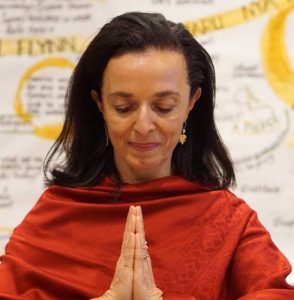
“Remembering the ethical precepts of yoga guides the best practices for how our program is unfolding,” says Mona. “Typically people come for the ways that they understand how the physical postures will build strength, mobility, balance, aid stress release and more, but ultimately, there is a growing awareness to and for connection is what begins to build, thus the name of this community class, The Yoga Connection.
“If we help women feel stronger, they will be stronger in all ways, and the social support will be part of that feeling stronger,” she confirms.
Mona says that Immigrant populations often arrive to the United States healthier than the general population, but their lifestyle changes exposes them to cardiovascular health risks over time.
Among the immigrant women, the health declines due to a reduction in physical activities and lower dietary quality. She calls this the culturally and linguistically diverse (CALD) migrants as these individuals adjust to both culture and modernization gaps.
In her opinion, despite the increased risk of chronic illnesses, individuals from the CALD groups are less likely to be proactive in accessing health-care or undertaking preventive measures to ensure optimal health outcomes.
These major impacts on refugees’ health are linked to their experiences in their country of origin, in refugee camps, when en route to the host country, and in asylum centers. These traumatic experiences lead to physical, emotional, and mental issues, and conditions that the modern medical care system may not be able to assist with.
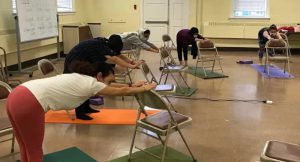 The problems can be from many angles: physicians lacking knowledge of the asylum seekers’ specific healthcare problems, language and intercultural communication problems, and access to and integration of asylum seekers into the healthcare system. Awareness of these conditions is necessary to help facilitate change toward successful resettlement with good quality of life, including participating in community.
The problems can be from many angles: physicians lacking knowledge of the asylum seekers’ specific healthcare problems, language and intercultural communication problems, and access to and integration of asylum seekers into the healthcare system. Awareness of these conditions is necessary to help facilitate change toward successful resettlement with good quality of life, including participating in community.
In order to holistically address the issues, and help them become positive contributing community members, Mona has been training volunteers and yoga instructors to work with them through the “Trauma Informed Training” programme.
“This is a training that has been developed for our volunteers and teachers, to make sure we are ready to be mindful and receptive of how trauma leaves a residue and how we can give value in our community yoga program to give space and offer yoga’s tools for healing,” she says.
Call-out to the community
“What does it take to really get participants to us?” asks Mona humbly. “Please share what you can, but if possible, meet with the immigrant friends that you know and sit down with them, help them understand just how to really register. Guide their registration process if they have language barriers.
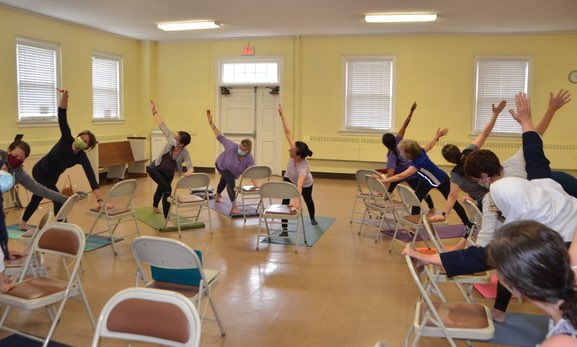 “Hear their voice, sharing where they might have hurdles. Offer to come practice with them. Teach them how to access zoom and how to check their email for their weekly class reminder.
“Hear their voice, sharing where they might have hurdles. Offer to come practice with them. Teach them how to access zoom and how to check their email for their weekly class reminder.
“Encourage their time to strengthen their body and connect to others. Help them to understand that we have an ‘accessible practice’ and be the example of how we are ready to ‘see’ and welcome them.”
You can register for the classes using the following link: https://www.the-yoga-connection.org/participate
Smita is a multi-cultural freelance journalist, writer, and filmmaker based out of the US, London, Hong Kong, and India. Global Indian Stories is her brain-child. Created to chronicle diaspora stories written by Indians of all age groups, from different walks of life across the globe, Smita makes sure that the platform remains inclusive and positive.
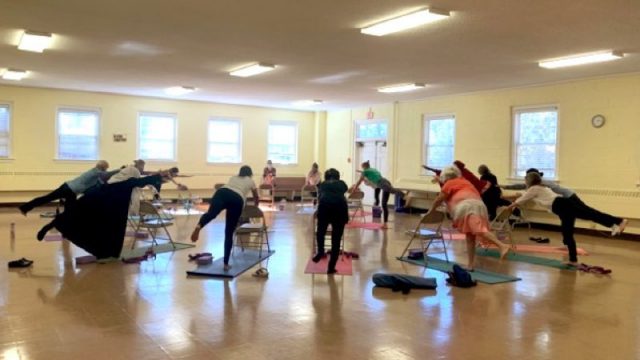

![Powerful Pride documentary Legendary Children [All Of Them Queer] streaming very soon](https://globalindianstories.org/wp-content/uploads/2025/06/Legendary-streaming-release-featured-238x178.jpg)



![Powerful Pride documentary Legendary Children [All Of Them Queer] streaming very soon](https://globalindianstories.org/wp-content/uploads/2025/06/Legendary-streaming-release-featured-100x75.jpg)

